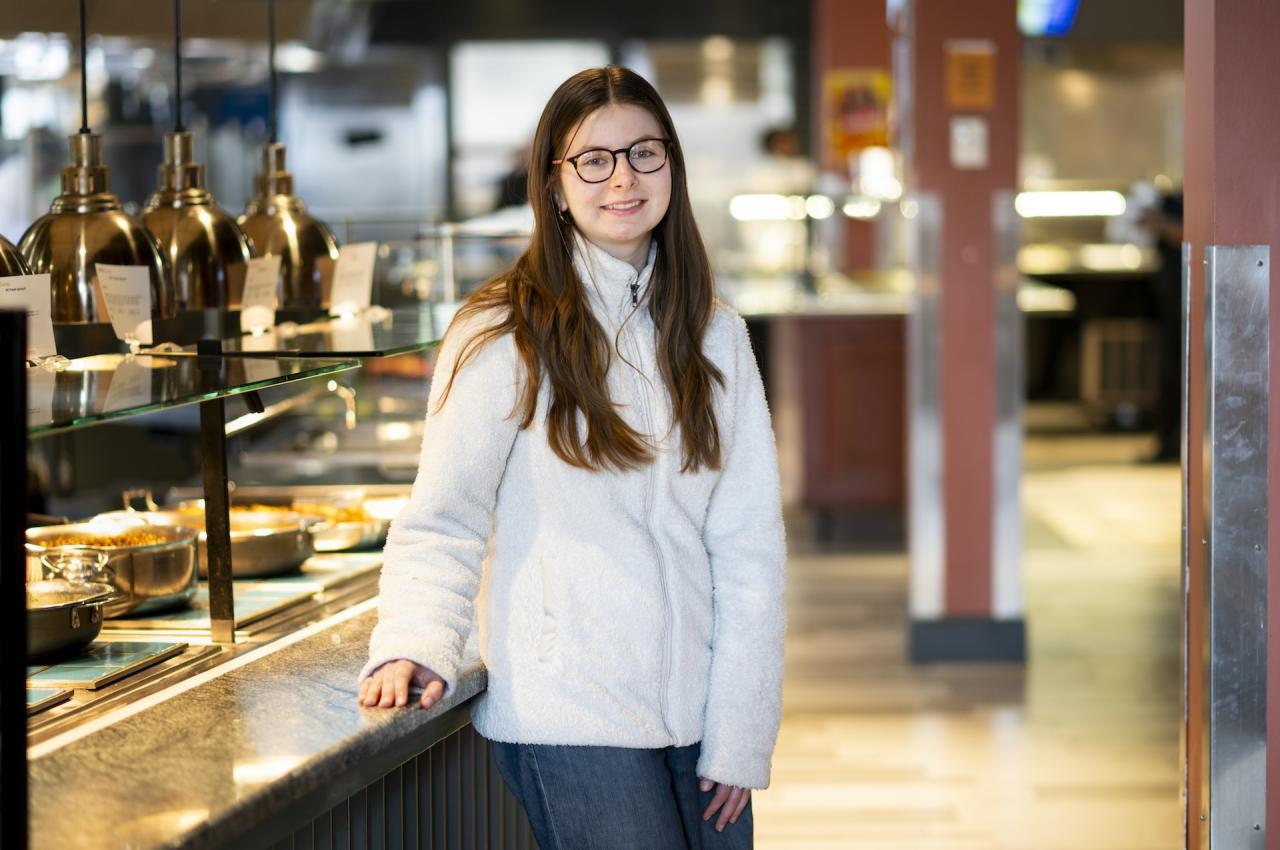Research Strengthens Dining Center Commitment to Buying Local
One of Tufts senior Saskia Zimmerman’s favorite items on the menu at Dewick-MacPhie Dining Center is the miso glazed hake. It’s not surprising: She’s been a pescatarian since high school, so she appreciates a fish dish with flair and, in that respect, hake delivers. A versatile white fish with a mild flavor, it pairs well with miso’s robustness, or with just about anything.
But Zimmerman’s appreciation for the entree is more than a matter of personal taste. She also likes what the hake—considered an “under-loved” or underappreciated and sustainably harvested species—represents for Tufts.
That broader context emerged in fall 2023 when Zimmerman became the first Sustainable Solutions Fellow to partner with Dining Services, one of the inaugural cohort of students to participate in the Sustainable Solutions Fellows program run by the Office of Sustainability.
Guided by Kelly Shaw, manager of nutrition and sustainability for Tufts Dining, Zimmerman researched seafood purchased for Dewick-MacPhie, the larger undergraduate dining center. This year, she continued the fellowship, focusing on the breakfast meal period in support of Dining Services as it explores how to expand plant-based options.
“Saskia had a specific mission and made it her own, which was great,” says Shaw. “The most important benefit was that she helped us see the scope of our overall seafood program; through her data analysis, we established a baseline for Dining Services as a whole, from which we can track progress. In 2024 we were at 57% local and we expect to be 60% local by next year.”
Zimmerman was also instrumental in laying the groundwork for Dining Services to raise awareness about the environmental and health benefits of fresh, local fish, Shaw says.
Zimmerman is not new to environmental-themed projects in dining halls. In high school in Darien, Connecticut, she helped start a composting program. At Tufts, she has found a good fit with environmental engineering; next year she will be earning a master’s degree at the School of Engineering in systems engineering. She recently shared some takeaways from her work as a Sustainable Solutions Fellow.
In fiscal year 2023, Tufts served more than 14,000 pounds of seafood, much of it local and sustainably harvested.
Dining Services wants to serve more local food, and it’s done a really good job at that. It’s part of its commitment to support local agriculture as well as local fisheries, both of which are sources of highly nutritious fresh food.
To find out about the sustainability practices of our bigger vendors, I had to do some digging. I discovered that for several years we have been buying the majority of our seafood, about 63%, from Foley Fish, a company with a commitment to sustainably harvest local fish. It was clear to me that they are a good partner for Tufts.
The university’s commitment to sustainable seafood is part of a regional program.
I began my research by looking at Monterey Bay Aquarium’s seafood watchlist and at university sustainability commitments that follow the Smart Catch guidelines. But I was looking for models more specific to New England. My breakthrough came when I found Gulf of Maine Tastemakers, a project of the Gulf of Maine Research Institute, that promotes purchasing more local seafood. Members need to source at least 35% of their seafood from the Gulf of Maine, southern Massachusetts, and Rhode Island.
Tufts Dining already qualified; local fish accounted for 50% of the university’s fish purchases in 2023. So Tufts joined other universities, as well as grocery stores and businesses, in this program. To have my research materialize into an official institutional commitment was super-exciting. And it's great for Tufts to have an easier way to talk about the good work that Tufts Dining is doing to promote sustainable, regional food systems.
Future demo events can highlight the local fish that Tufts students are served.
Tufts Dining menus are very intentional. We’ve talked about doing different events to raise awareness about sustainability and especially to encourage students to try fish dishes that might be new to them; some species, like hake, are what we call under-loved. When I met with Foley, they were really excited about that too and offered to provide a live cooking demonstration to help students overcome any hesitation.
Dining Services can help students make informed food choices.
Being a Sustainable Solutions Fellow has changed the way that I think about food as part of larger food systems. Because I'm a pescatarian, I haven't eaten beef for a long time. I’ve seen food as an expression of my own values. But this fellowship got me thinking about how other people make food choices and why.
It makes me think about dining halls as places where we can have a high impact on shaping those choices. If you think about a dining hall as a place where students can start to form lifelong food commitments, what we offer them and how we offer it can encourage them to be intentional too, not only at Tufts, but also long after they have graduated.













